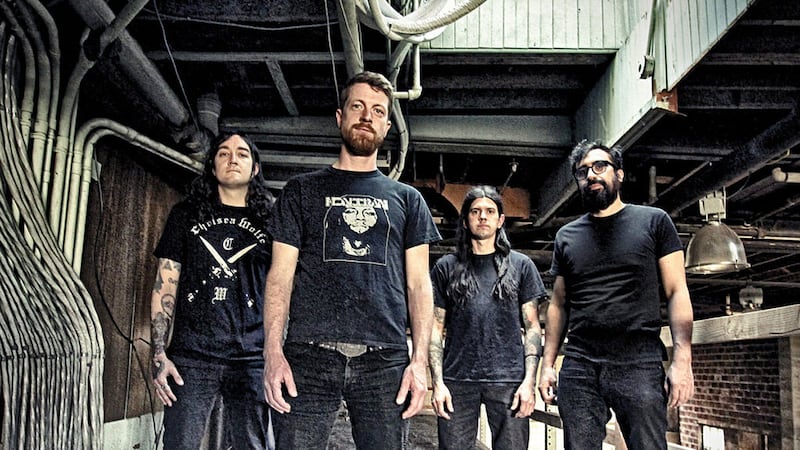Oregon is burning, record-breaking hurricanes are pummeling the Southeast, North Korea is threatening nuclear war—Usnea really couldn't have timed the release of their new album better.
Portals Into Futility, the crushing Portland doom-metal four-piece's devastating third effort, reeks of impending chaos and unforgiving defeat. Not only that, it reminds us how helpless our whole species is in the face of cosmic forces.
"We wanted to make the next album more about dystopian sci-fi," says singer-guitarist Justin Cory, "and it felt really correct with what's going on in the world, too."
Space-themed metal used to fixate on aliens and other untold terrors that may or may not lurk beyond our reaches, but nowadays, there's enough source material in our current sphere of knowledge to inspire opuses of planetary decay. In the eyes of singer-bassist Joel Williams, some of the band's favorite sci-fi is becoming less fiction and "more prophecy."
"It went from Lovecraftian to, 'Oh, we're fucked,'" he says.
Portals' lyrics were inspired by heady sci-fi fare like Margaret Atwood's The Handmaid's Tale and Gene Wolfe's Book of the New Sun series, and matching them is a sound that's alternately oppressive, dizzying and haunting. Prior to forming Usnea in 2011, most of its members were veterans of various genres in the punk and metal spheres. And while the music is based in the unrelenting crunch of doom, it draws from outside those realms as well.
"I grew up playing classical violin," says guitarist Johnny Lovingood. "So I love the long, drawn-out, no-fucking-chorus type of stuff that we do. There's a movement to it—it starts here, it ends there and rarely does it repeat in the middle."
On their third album, Usnea continue unlocking the possibilities of glacially slow arrangement by patiently ebbing from ominous, swirling post-rock to pitch-black sludge, evoking gradual but cataclysmic shifts of the natural world and cosmos.
The biggest change from the band's first two albums—apart from a longer gestation process, three years compared to the 18 months between their first two albums—is a "willingness to include clean vocals," Cory says.
Don't expect skyscraping, Pallbearer-style vocal leads. But there are moments when the storm briefly breaks and Cory guides us through the eye of the hurricane with plaintive singing that offers respite from his bloodcurdling shrieks and Williams' guttural howls. Nowhere is this more effective than on 19-minute closer "A Crown of Desolation," which begins by describing the chaotic overthrowing of a tyrannical regime and ends with the forlorn realization that we're doomed to repeat history.
With Portals Into Futility, Usnea offer earthly defeatism that gives way to cosmic indifference—and, after enough listens, some twisted form of hope.
"Humans are inconsequential in terms of the universe," Cory says. "If the earth explodes, the only ones who are gonna mourn us are ourselves. But at the same time, we are the stardust looking back and being sentient of itself, and as far as we know, there's no other example of that."
SEE IT: Usnea plays Tonic Lounge, 3100 NE Sandy Blvd., with Thrones, Hands of Thieves and Ninth Moon Black, on Friday, Sept. 16. 8 pm. $7 advance, $10 day of show. 21+.
